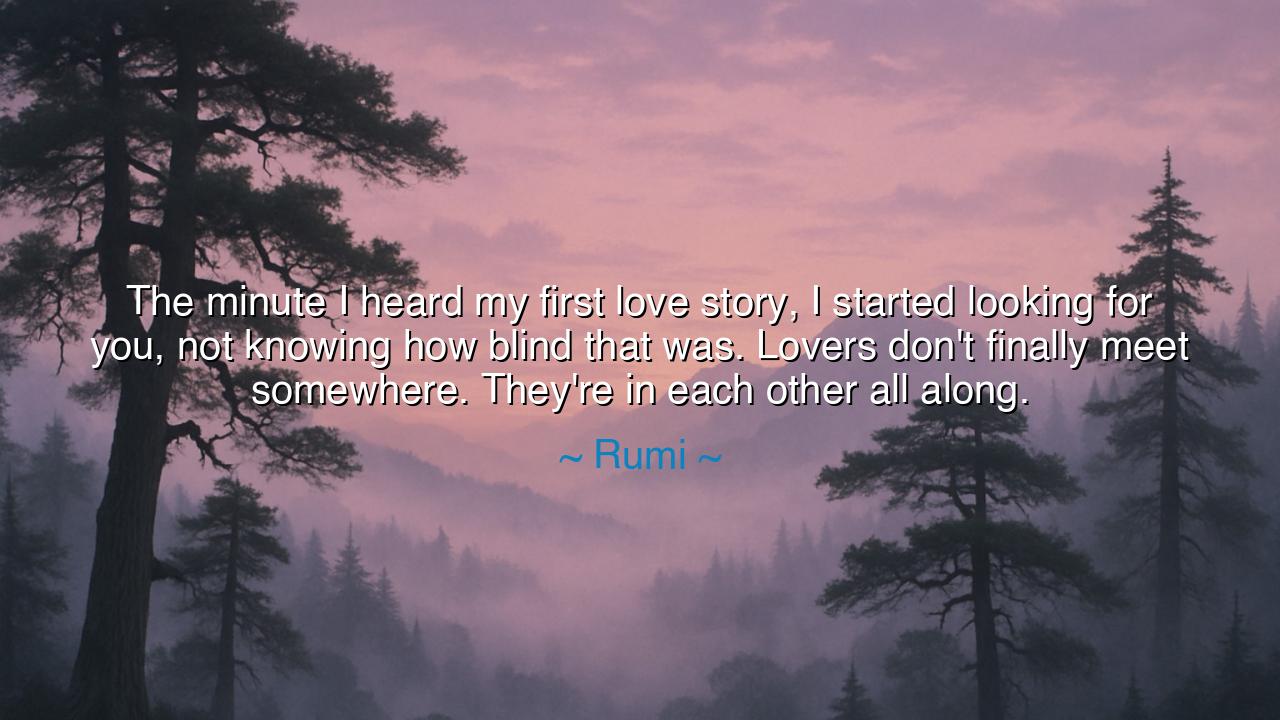
The minute I heard my first love story, I started looking for
The minute I heard my first love story, I started looking for you, not knowing how blind that was. Lovers don't finally meet somewhere. They're in each other all along.






"The minute I heard my first love story, I started looking for you, not knowing how blind that was. Lovers don’t finally meet somewhere. They’re in each other all along." — thus spoke Rumi, the mystic poet whose words are lanterns for the soul. In this verse, Rumi unveils a truth deeper than the oceans of the heart: that love is not found, but remembered; not sought outside, but awakened within. He reminds us that what we call “searching for love” is, in truth, the soul’s journey back to itself — for the beloved we seek has always dwelled within us, hidden beneath the veils of longing and illusion.
To hear one’s first love story, as Rumi says, is to awaken desire — that restless urge that stirs when the soul first dreams of completion. It is the call of the heart toward unity. Yet, in that first moment, the seeker misunderstands. He looks outward, imagining that love must be found in another body, another face, another name. He runs from place to place, chasing echoes of something eternal. But, as Rumi teaches, this search is blindness. The beloved is not a distant being waiting at the end of the road — the beloved is the light that guides the road itself. For the heart of another is but a mirror of the love that already dwells in your own.
The origin of Rumi’s wisdom lies in his own life. He was not merely a poet, but a scholar and jurist until the day he met Shams of Tabriz, the wandering mystic who ignited his soul. Their meeting was no accident — it was the recognition of two flames that had always burned toward each other. Through Shams, Rumi discovered not romance, but divine union, the realization that every form of love — earthly, spiritual, human — is a reflection of the same eternal source. When Shams disappeared, Rumi did not lose him; he found him more deeply, within his own heart. Out of that sorrow, he wrote poems that transformed grief into revelation. Thus, when he says that lovers are in each other all along, he speaks from the fire of experience.
Consider also the story of Socrates, who taught that love — or eros — is the force that draws the soul toward truth and beauty. To love another, he said, is to glimpse the divine essence within them, and through that vision, to remember our own divine nature. Rumi’s teaching is the same, expressed in the language of the heart rather than philosophy. The lover and the beloved are not two; they are reflections of the One. When you love, you are not discovering something new — you are uncovering the part of yourself that has always been connected to the other, as rivers are connected to the sea.
Rumi’s words also reveal the illusion of separation, that ancient error which leads humanity into sorrow. We believe we are alone, and so we seek completion in others. But when we realize that the soul is whole in itself — that love is not possession but recognition — the search ends, and peace begins. The one who truly loves does not grasp or demand, for he knows that the beloved is not outside him but within him, and within all things. Such love is not confined to one form or one being; it radiates like sunlight, touching everything without losing itself.
To live by this wisdom is to transform how we love. When you meet someone and feel your heart stir, do not think, “I have found them at last.” Instead, whisper, “I have found the reflection of what I have carried all along.” In this way, you will love more freely, more deeply, and without fear of loss. For the one who recognizes the beloved within cannot be abandoned; they carry eternity inside them. Even when lovers part, the connection remains, because it was never born of distance — it was born of oneness.
Let this be your teaching, O seeker of love: Stop searching outwardly for what you already are. Love is not a destination; it is your essence. Do not wander through the world asking, “Where is my beloved?” Instead, cultivate stillness, and listen — for the beloved speaks through your breath, your dreams, and every beat of your heart. When you love another truly, you are not finding them, but remembering yourself through them.
Thus, Rumi’s words are both tender and thunderous: a call to awaken from the illusion of longing. The true lovers, he tells us, are never strangers meeting for the first time — they are ancient companions, united before time began, merely recognizing each other in this brief dance of earthly life. So when love finds you, bow in gratitude. Do not clutch at it, for it was never outside your grasp. It has been there, glowing quietly within you — the eternal flame of connection, the music of the soul that never needed to be found, only heard.






AAdministratorAdministrator
Welcome, honored guests. Please leave a comment, we will respond soon